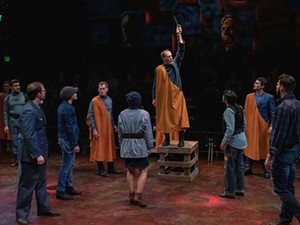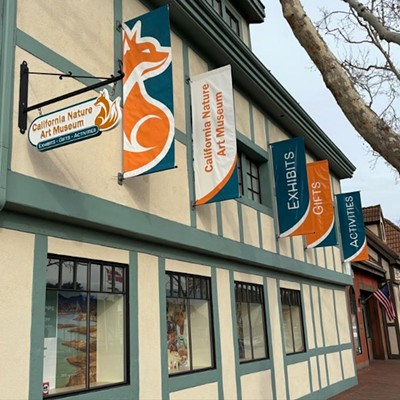Friends, Romans, countrymen, lend me your ears—the Pacific Conservatory Theatre’s (PCPA) production of The Tragedy of Julius Caesar is here. What better way to spend this year’s Ides of March (and through March 22) than with William Shakespeare’s quintessential, historical tale of political upheaval?

One key factor I enjoyed about this iteration, helmed by director Mark Booher, is its brooding intimacy. Held in the Severson Theatre, the stage is surrounded on all four sides (unique compared to the thrust stage of the neighboring Marian Theatre, often PCPA’s venue of choice). I can’t speak for the whole audience, but I felt as if I was part of the crowd onlooking Caesar’s (Michael Tremblay) triumphant return to Rome, after a military victory.
The visceral herd mentality feeling reaches its peak at Marc Antony’s (Yusef Seevers) stirring funeral speech, presenting Caesar’s bloody corpse to the masses; I felt genuinely moved, like most of the Roman commoners in attendance. Seevers is just so damn good, and his speech is all the more powerful when compared to the shared tenacity of his peers, whether they be friends or foes, onstage (the entire cast is brilliant). It’s as if I’m truly part of the mob in those moments, ready to revolt against Brutus (Peter S. Hadres), Cassius (Andrew Philpot), Casca (Katie Fuchs-Wackowski), and the other conspirators.

I may not be wearing a tunic or sandals, but the players’ attire isn’t nearly as B.C. as you might be imagining. Costume designer Eddy L. Barrows chose a more modern approach with the show’s wardrobe—stylistically anachronistic with rewarding results. The more militant Romans sport camouflage patterns (already game for the imminent civil war begging to erupt). Other characters are caught in blazers by day, and rain hats and ponchos during the stormy night preceding Caesar’s violent demise. And nearly everyone is in jeans, except Caesar himself, whose getup notably resembles a certain 20th century dictator, complete with a wide Sam Browne belt over his suit jacket and tie.
The set, thoughtfully arranged by scenic designer Abby Hogan, supports the timeless atmosphere. Before the show even began, I was immediately intrigued upon entering the theater, especially at the ceiling. At every corner of the venue hangs what appears to be a dead body wrapped in tarp (think the opening scene of Sicario), while a statue of Caesar faces us, upside down, attached to the ceiling’s center. The walls are adorned with Caesar’s image as well, in rectangular prints, which resemble political campaign posters.
In press materials, Booher reflects on the modern tone and refers to The Tragedy of Julius Caesar as a “play for today.”
“It serves as a springboard for us to think about big ideas: power, honor, love, and betrayal, sacrifice, and friendships on an epic scale. Even as someone who loves so many of [Shakespeare’s] other plays this is incomparably powerful,” Booher said. “You’ll turn a page and read a passage and it’s shocking how incredibly alive and contemporary this work is. You can’t help but be amazed by it.”
Arts Editor Caleb Wiseblood used a fork to stab Caesar (the salad). Reach him at [email protected].










